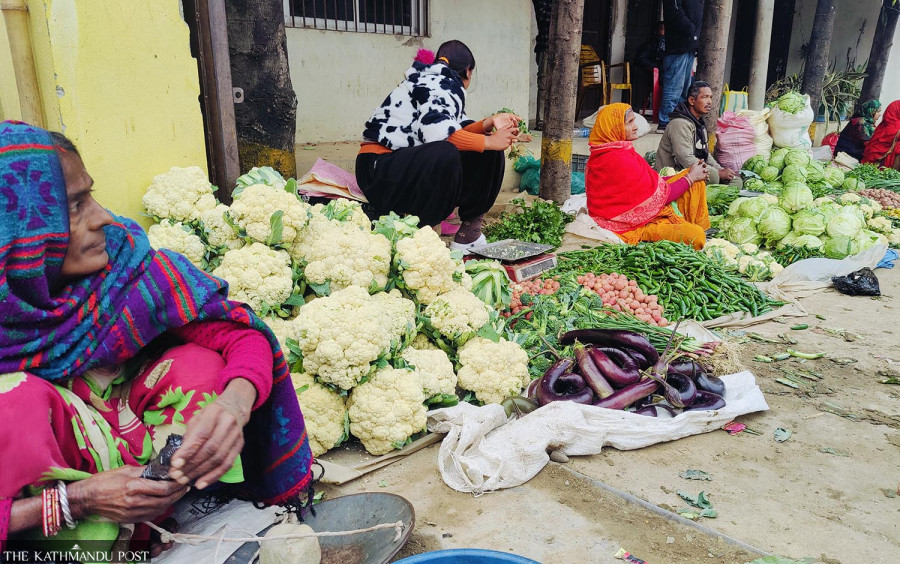Money
Farmers in Mahottari struggle as vegetable prices plummet
Cauliflower, which sold for Rs 70-100 per kg last week, has sharply declined in price to Rs10 per kg.
Sunita Baral
Ganga Chaudhary, a farmer in Gaushala, is compelled to sell vegetables for low prices as there is little demand for her produce in the market.
She usually travels to Bardibas to sell vegetables. However, even there, she has to sell her goods at reduced rates, often failing to recover her investment and transport costs. The vegetables she grows hardly fetch a fair value.
“Last Saturday, I sold cauliflower at Rs10 per kg. It did not get the same value on Sunday,” said Chaudhary. She added that the cost of production—including seeds, fertilisers, pesticides, and labour—is significantly higher than the selling price.
Nepal is a predominantly agrarian country that relies heavily on agriculture. The sector employs about 65 percent of the population and contributes approximately 24 percent to the national GDP. However, despite its centrality to the economy and society, Nepali farmers face many challenges that hinder their productivity, sustainability, and well-being.
A growing trend of youth migration to urban areas or foreign countries for better opportunities has left rural farming communities with a shrinking labour force. As a result, many farms are underutilised, and productivity declines.
Government policies often fail to address farmers’ specific needs. Agricultural subsidies are either insufficient or poorly implemented, and crop and livestock insurance schemes are limited in coverage. There is also a lack of focus on research and development in agriculture, which hinders innovation.
Farmers in Bardibas have long demanded a well-equipped cold storage facility, but its construction has been delayed.
Sunil Singh, another farmer from Kishannagar in Bardibas, expressed his frustration that growing vegetables often has no benefits. “It takes months of hard work to produce vegetables. But when it’s time to sell them, farmers like me face a dilemma.”
Selling vegetables directly yields a marginal benefit of Rs2-4 per kg. “If we sell to traders, there is no profit at all,” Singh added.
Due to a bumper harvest, vegetable prices in the Bardibas market have plummeted to a quarter of last week’s rates. Farmers have been unable to secure reasonable prices for their produce for several weeks.
Cauliflower, which sold for Rs70–100 per kg last week, has had a freefall to Rs10 per kg. According to a committee helping farmers in Bardibas, potato prices have dropped from Rs120 per kg two weeks ago to Rs40 per kg. Similarly, cabbage prices fell to Rs20 per kg from Rs60, radishes to Rs5 per kg from Rs40, and eggplants to Rs20 per kg from Rs60.
When farmers are forced to sell all their produce immediately after harvest, it leads to market saturation and drives down prices. If they choose to sell to intermediaries with access to cold storage, they only get lower prices.
Without cold storage, produce may deteriorate in appearance and taste, resulting in lower grades and prices.
Farmers and traders attribute the decade-low vegetable prices to a bumper harvest. “The prices of both seasonal and unseasonal vegetables have dropped sharply,” said Bodh Bahadur Ale, president of the Krishi Upaj Bazaar Sanchalak Samiti, Bardibas.
There are approximately 150 stalls selling vegetables in Bardibas, and all traders and farmers have reported dissatisfaction with the rates. “Farmers have achieved a bumper crop production this year, mainly vegetables, but the market demand is low. As a result, the prices are undervalued,” said Ale.
Ale emphasised the need to build cold storage facilities to store surplus produce. “The government needs to support farmers,” he stated. “If the surplus vegetables are stored, prices will rise in a few weeks when demand goes up.”
For this to happen, Ale urged local government’s support in managing seasonal and non-seasonal produce. “Excess vegetables must be stored in cold storage and brought to market when demand is higher,” he said, calling for a farmer- and trader-friendly policy to develop cold storage infrastructure.
Although Bardibas municipality initiated the construction of cold storage facilities for seasonal fruits and vegetables, the project has stalled, adversely affecting many farmers.
After farmers demanded such facilities, cold storage construction began in Modern Agro Village, Bardibas under the provincial government’s agriculture programme. However, the municipality failed to allocate funds for the project in the current fiscal year.
Synergi Gyanjyoti Joint Ventures won the tender to build the cold storage in the fiscal year 2018-19 but has yet to complete essential work like building the walls.
Despite this, Sharmila Kumari Tamang, the account chief of Bardibas municipality, said the company received payment from the municipality in the fiscal year 2022-23, claiming it had fulfilled its contractual obligations.
The payment amounted to Rs54.23 million.
Farmers in the Tarai region increasingly worry that fog, cold waves, and market challenges will damage their vegetables.




 8.67°C Kathmandu
8.67°C Kathmandu














